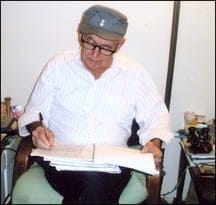
DOWNTOWN — He went missing more than a year ago, and the person who should be the most concerned doesn’t seem to be bothered by her husband’s disappearance, and possible death.
“He was pretty mean to me at the very end,” said Santa Monican Marcia Carter, wife for 46 years to Donald Carter, 77, who disappeared June 28, 2010 while hiking near Castaic Lake. “He either ignored me or insulted me. … I’m at peace with it.”
Marcia Carter, 82, who lives alone in a Community Corporation of Santa Monica apartment on Fourth Street, has thought of declaring her husband dead, but according to the California Probate Code, she has to wait another four years before doing so.
She’s almost certain her husband is gone because he hasn’t used any of their credit cards and, as far as she knows, he didn’t have much cash.
She’s on a fixed income, collecting only Social Security benefits for herself. She said the federal government cut off her husband’s Social Security checks after he went missing.
“It’s a little hard because he used to do some things in the house like take out the garbage, help me a little bit with the shopping,” she said of her husband, whom she met while working in Chicago. “He changed a lot. I think he might have had some mental illness or Alzheimer’s.”
His mother, Dorothy, spent much of her life institutionalized because of mental health problems, said Toby Terrar, 66, a friend of the Carters who lives in Washington, D.C. and works part-time as a public defender.
“Don was what you would call a working class intellectual,” Terrar said. “He grew up pretty much a poor boy.”
While Marcia Cater and Terrar have a strong feeling that Donald Carter is dead (Terrar going so far as to write an obituary, which he e-mailed to the Daily Press), he is still considered missing by the Santa Monica Police Department. Detective Larry Nicols with the Cold Case Unit is investigating, but he said he has no leads to pursue and hasn’t received many phone calls from friends or relatives pressing him to find the man.
“A lot of missing persons cases you go to an apartment and something’s there that leads you to expect foul play or whatever,” Nicols said. “In this case, nothing came up during the investigation. It wasn’t like there was a hair sticking up on anyone’s neck, or anything like that. It’s like he went completely off the grid.”
Marcia Carter said her husband loved to go hiking once a week and would typically rent a truck to bring back rocks he collected along the way. He collected many other things as well, like old telephones, tools and typewriters.
“Our apartment is full of the stuff,” she said.
On the day he went missing, Marcia Carter said her husband dropped her off at the YMCA, went back home and wrote her a note saying he was going for a hike and expected to be back later that day. When he didn’t return home, Marcia Carter notified police and sheriff’s deputies in Santa Clarita searched an area near Warm Springs, about 11 miles east of Interstate 5, by Lake Hughes Road.
That’s where deputies found Donald Carter’s 1979 Honda Civic parked with no signs of foul play. After searching overnight and into the morning, deputies gave up.
Nineteen people from three different search and rescue teams, eight dogs and an aerial squad combed the area.
“We couldn’t find him,” Lt. Mark Hershey of the Santa Clarita Valley Sheriff’s Station said at the time.
When he disappeared, Donald Carter was described as a white male, standing 5 feet, 7 inches and weighing 140 pounds. He had gray hair, brown eyes and a slight build. He was in good physical shape.
“We wasn’t a drinker and never smoked,” Terrar said. “He was a pretty clean liver.”
Donald Carter was born on March 3, 1933 in Cincinnati, Ohio. His father was run over by a train when Donald Carter was only 3, Terrar said. Because his mother was in and out of mental institutions, he was sent to live in an orphanage. He never finished high school and would often criticize the public school system, saying it was designed to keep certain people locked into a permanent subclass.
Later in life, he would become a devout communist, Terrar said, who when not working several odd jobs as a mechanic, glass blower or machinist, would write fiction; most stories had proletarian plots where the main character rises up against the oppressive elite.
In 1972 he and his wife moved to Santa Monica where Marcia Carter was active in local politics. She worked at the Credit Bureau on Fifth Street and Arizona Avenue while Donald Carter worked at a machine shop.
The two seemed to live separate lives in recent years, Marcia Carter said. They used to travel often throughout California and into Canada, but old age put an end to that. “I can barely walk, but he could walk very fast,” she said.
The two never had children.
“She made a commitment to be married to the guy for better or worse and she stuck it out,” Terrar said. “I got the idea that she did not want to migrate to California in the 1960s. She came because Don was going to come with or without her.
“Marcia says he was crazy — in a clinical way. I never got that idea, but I was not living with him,” Terrar added. “If Marcia is right, she was a long-suffering hero.”
Toward the end, Marcia Carter said her husband spent a lot of time alone, and would often play chess by himself. She found herself relying more on friends to help her run errands. It was almost as if he disappeared long before that hike.
“I don’t believe he’s coming back,” she said.
kevinh@www.smdp.com

